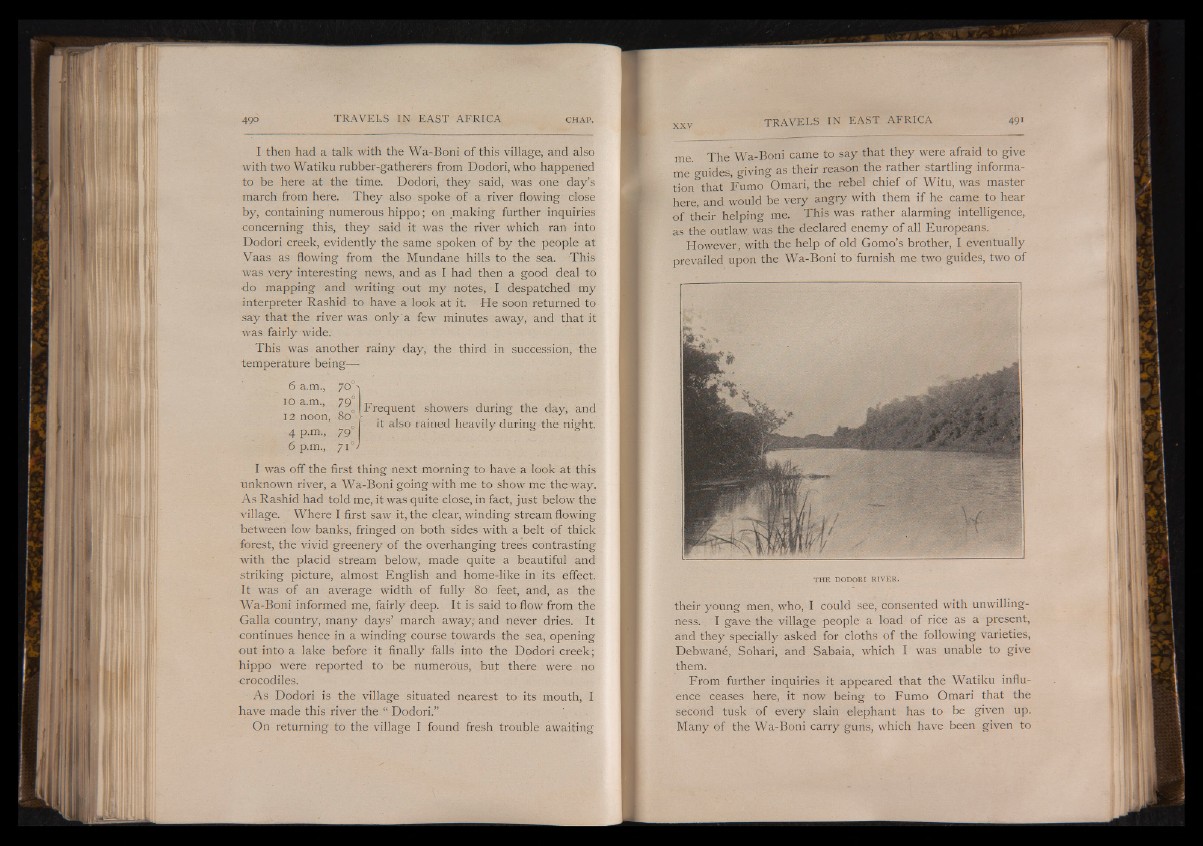
I then had a talk with the Wa-Boni of this village, and also
with two Watiku rubber-gatherers from Dodori, who happened
to be here at the time. Dodori, they said, was one day’s
march from here. They also spoke of a river flowing close
by, containing numerous hippo; on making further inquiries
•concerning this, they said it was the river which ran into
Dodori creek, evidently the same spoken of by the people at
Vaas as flowing from the Mundane hills to the sea. This
was very interesting news, and as I had then a good deal to
•do mapping and writing out my notes, I despatched my
interpreter Rashid to have a look at it. He soon returned to
say that the river was only'a few minutes away, and that it
was fairly wide.
This was another rainy day, the third in succession, the
temperature being—
6 a.m., 70V
10 a.m., 79^.Frequent showers during the day, and
12 noon, 80 . . . , , , . , . ,
0 it also rained heavily 4 p.m., 79 during the night.
6 p.m., 7 1°-
I was off the first thing next morning to have a look at this
unknown river, a Wa-Boni going with me to show me the way.
As Rashid had told me, it was quite close, in fact, just below the
village. Where I first saw it, the clear, winding stream flowing
between low banks, fringed on both sides with a belt of thick
forest, the vivid greenery of the overhanging trees contrasting
with the placid stream below, made quite a beautiful and
striking picture, almost English and home-like in its effect.
It was of an average width of fully 80 feet, and,, as the
Wa-Boni informed me, fairly deep. It is said to flow from the
Galla country, many days’ march away; and never dries. It
continues hence in a winding course towards the sea, opening
•out into a lake before it finally falls into the Dodori creek;
hippo were reported to be numerous, but there were no
crocodiles.
• As Dodori is the village situated nearest to its mouth, I
have made this river the “ Dodori.”
On returning to the village I found fresh trouble awaiting
me The Wa-Boni came to say that they were afraid to give
me guides, giving as their reason the rather startling information
that Fumo Omari, the rebel chief of Witu, was master
here, and would be very angry with them if he came to hear
of their helping me. This was rather alarming intelligence,
as the outlaw, was the declared enemy of all Europeans.
However, with the help of old Gomo’s brother, I eventually
prevailed upon the Wa-Boni to furnish me two guides, two of
THE DODORI RIVER.
their young men, who, I could see, consented with unwillingness.
I gave the village people a load of rice as a present,
and they specially asked for cloths of the following varieties,
Debwane, Sohari, and Sabaia, which I was unable to give
them.
From further inquiries it appeared that the Watiku influence
ceases here, it now being to Fumo Omari that the
second tusk of every slain elephant has to be given up.
Many of the Wa-Boni carry guns, which have been given to